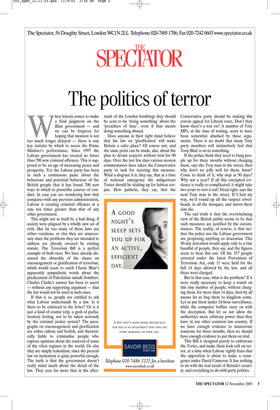The politics of terror
When history comes to make a final judgment on the Blair government — and we can be forgiven for hoping that moment is not too much longer delayed — there is one key statistic by which to assess the Prime Minister’s performance. Since 1997 the Labour government has created no fewer than 700 new criminal offences. This is supposed to be an age of increasing peace and prosperity. Yet the Labour party has been in such a continuous panic about the behaviour and potential behaviour of the British people that it has found 700 new ways in which to proscribe courses of conduct. In case you are wondering how that compares with any previous administration, Labour is creating criminal offences at a rate ten times greater than that of any other government.
This might not in itself be a bad thing, if society were plagued by a wholly new set of evils. But far too many of these laws are either vexatious, or else they are unnecessary since the problems they are intended to address are already covered by existing statute. The Terrorism Bill is a perfect example of both vices. We have already discussed the absurdity of the clause on encouragement or glorification of terrorism, which would seem to catch Cherie Blair’s apparently sympathetic words about the predicament of Palestinian suicide bombers. Charles Clarke’s answer has been to assert — without any supporting argument — that the law would not be used in such cases.
If that is so, people are entitled to ask what Labour understands by a law. Is it there to be enforced to the letter? Or is it just a kind of cosmic yelp, a gush of parliamentary feeling, not to be taken seriously by the criminal justice system? The paragraphs on encouragement and glorification are either odious and foolish, and theoretically liable to criminalise people who express opinions about the removal of some of the vilest regimes in the world. Or else they are simply redundant, since the present law on incitement is quite powerful enough. The truth is that the government doesn’t really mind much about the detail of the law. They care far more that in the after math of the London bombings they should be seen to be ‘doing something’ about the ‘preachers of hate’, even if that means doing something absurd.
Does anyone in their right mind believe that the law on ‘glorification’ will make Britain a safer place? Of course not, and the same point can be made, alas, about the plan to detain suspects without trial for 90 days. Over the last few days various neocon commentators have taken the Conservative party to task for resisting this measure. What a disgrace it is, they say, that at a time of national emergency the milquetoast Tories should be sticking up for habeas corpus. How pathetic, they say, that the Conservative party should be making this craven appeal for Liberal votes. Don’t they know there’s a war on? A number of Tory MPs, at the time of writing, seem to have been somewhat abashed by these arguments. There is no doubt that many Tory party members will instinctively feel that Tony Blair is on to something.
If the police think they need to bang people up for three months without charging them, says the Tory man in the street, then why don’t we jolly well let them, hmm? Come to think of it, why stop at 90 days? Why not a year? If all this encrypted evidence is really so complicated, it might take two years to sort it out! Dead right, says the next Tory man in the street. If I had my way, we’d round up all the suspect towelheads, in all the mosques, and intern them sine die.
The sad truth is that the overwhelming view of the British public seems to be that such measures are justified by the circumstances. The reality, of course, is that neither the police nor the Labour government are proposing anything so draconian. This 90-day detention would apply only to a tiny handful of people, they say, and the figures seem to bear this out. Of the 357 people arrested under the latest Prevention of Terrorism Act, only 11 were held for the full 14 days allowed by the law, and all these were charged.
But in that case, what is the problem? If it were really necessary to keep a watch on this tiny number of people, without charging them, for more than 14 days, then by all means let us bug them to kingdom come. Let us put them under 24-hour surveillance, while the computer boffins carry on with the decryption. But let us not allow the authorities more arbitrary power than they have in any other common law country. If we have enough evidence to incarcerate someone for three months, then we should have enough evidence to put them on trial.
This Bill is designed purely to embarrass the Tories, and make them look soft on terror, at a time when Labour rightly fears that the opposition is about to make a resurgence under David Cameron. It has nothing to do with the real needs of Britain’s security, and everything to do with party politics.



























































 Previous page
Previous page